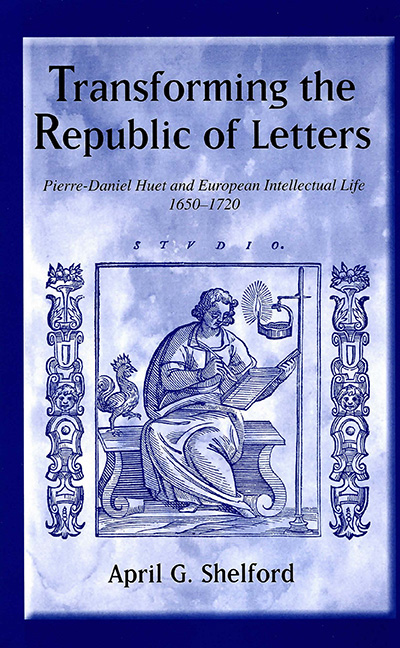Book contents
- Frontmatter
- Dedication
- Contents
- List of Illustrations
- Acknowledgments
- Introduction
- Chapter 1 The Road to Parnassus, 1648–61
- Chapter 2 The Lives of Poems, 1653–63
- Chapter 3 The Empire of Women, 1651–89
- Chapter 4 The Gate of Ivory, 1646–90
- Chapter 5 Defending Parnassus, 1666–92
- Conclusion A Dialogue with the Future
- Notes
- Selected Bibliography
- Index
Conclusion - A Dialogue with the Future
Published online by Cambridge University Press: 11 May 2017
- Frontmatter
- Dedication
- Contents
- List of Illustrations
- Acknowledgments
- Introduction
- Chapter 1 The Road to Parnassus, 1648–61
- Chapter 2 The Lives of Poems, 1653–63
- Chapter 3 The Empire of Women, 1651–89
- Chapter 4 The Gate of Ivory, 1646–90
- Chapter 5 Defending Parnassus, 1666–92
- Conclusion A Dialogue with the Future
- Notes
- Selected Bibliography
- Index
Summary
C'est une grande folie de vouloir être sage tout seul.
—La RochefoucauldIn 1751, the first volumes of the Encyclopédie began to appear; the last would roll off the presses twenty years later, surviving violent criticism and clearing the hurdles of official censorship. What began as a modest commercial venture swelled to twenty-eight folio volumes. It contained tens of thousands of articles by more than 150 authors, accompanied by thousands of meticulously rendered illustrations that detailed everything from brain surgery to pin making, from sewing garments to the proportions of the Belvedere Apollo.
The Encyclopédie is regarded as one of the Enlightenment's greatest achievements. It was also a manifesto of the self-described society of men of letters who wrote it. They claimed the right to question all received knowledge, from the political to the religious, to test it in the light of their natural reason. They distinguished between useless and useful knowledge, offering the latter to the public as an encouragement to future progress. They defined themselves as a new kind of intellectual—a philosophe—one entitled to a special status, regardless of birth, and one entitled to be heard. Such pretensions demanded explanation, if not justification, and this task fell to Jean d'Alembert (1717–83).
Then in his thirties, d'Alembert was one of the project's editors, and he would eventually author some 1,400 articles. He was also an exemplar of the new intellectual type, combining innovative work in mathematics with success in the Paris salons, and he was a member of the Royal Academy of Sciences. In his introduction, d'Alembert set the Encyclopédie in an artfully constructed historical context. It was not a history of kings and kingdoms, but of ideas and intellectuals culminating in the Encyclopédie. It was also profoundly polemical. Starting with “the renaissance of letters,” argued d'Alembert, “the progress of the mind” had followed a natural sequence; it began as erudition, continued as belles-lettres, and blossomed into philosophy during d'Alembert's own age. Because the progression was “natural,” each state was necessary, and each was necessarily surpassed by the next.
Erudition developed first, d'Alembert wrote, because it depended on memory, a crucial, but relatively primitive cognitive faculty in the view of many philosophes. However, the Renaissance scholars mistook reading for learning and understanding. The érudits consumed everything written by the Ancients, and then began to slavishly imitate and worship them.
- Type
- Chapter
- Information
- Transforming the Republic of LettersPierre-Daniel Huet and European Intellectual Life, 1650–1720, pp. 184 - 190Publisher: Boydell & BrewerPrint publication year: 2007



